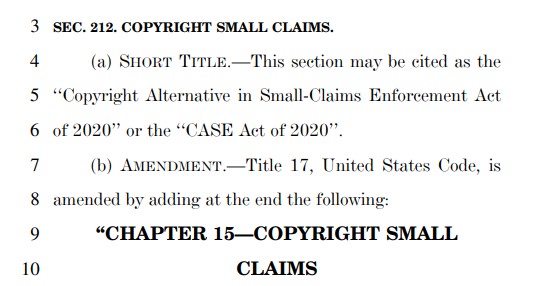We are delighted to kick off the 9th Annual Fair Use Week with a guest post by the international copyright expert, Kenneth D. Crews, as he predicts the role of fair use in the U.S. Copyright Office’s new small claims court. -Kyle K. Courtney

Fair Use and Small Claims: Getting Ready for the Big Deal
by Kenneth D. Crews
An irony of fair use is that it can be patiently supportive and thoroughly demanding at the same time. It can nurture the individual spirit, and simultaneously require complex litigation strategies. In our daily pursuits, we might be comfortable clipping, pasting, mixing, adapting, and generally engaging with fair use in an enlivened quest for creativity. On the other hand, if ever we had to convince a judge of our legal position, we would become immersed in extensive research and analytical arguments.

That ambivalence of fair use may soon reveal itself with the opening of the new “small-claims court” for copyright infringements. I and others have written generally about this new quasi-judicial Copyright Claims Board, soon to commence operations within the U.S. Copyright Office. The new Board was established with the passage of the CASE Act, enacted by Congress in late 2020 as part of an appropriations bill. It creates a distinct process for bringing and resolving “small” copyright infringement actions that may come before this new Board and the three Copyright Claims Officers who will rule in proceedings. The Officers can hear allegations of infringement, and they can act on defenses, including fair use.
The Board has authority to award damages, generally capped at $30,000 per proceeding, and the expectation is that the Board will make determinations in common matters where the total dollars at risk are not exorbitant. The Board may hear cases about scanned and uploaded pages, or movie clips posted to personal websites and on YouTube. Depending on the exact facts of each claimed infringement, these familiar pursuits could form an ideal context for confrontations over fair use.
Some battles will not actually occur. A crucial element of the Case Act, intended to buffer it from constitutional challenge, is the broad authority of respondents who are hit with claims to opt out of the system, leaving the original copyright owners with the choice to file the case in the conventional federal courts – exactly the burdensome and expensive option the claimant hoped to avoid. Opting out will likely be common. But some cases will nonetheless proceed, bringing fair use to the fore.
Jump ahead several years: The determinations of the Copyright Claims Board are required to be publicly reported. We might get only brief conclusions. With luck, we might see a dense public record of allegations and evidence, documents and arguments, and the Board’s explanations and rationale. However, the new law states unequivocally that the rulings are not to have any precedential value. That stipulation will do nothing to stop analyses of the Board’s track record and the use of trends and analytics in strategic planning by future parties. Whether we like it or not, in the years ahead, we will be exploring and exploiting the direction that the Copyright Claims Board has taken on the meaning and application of fair use.
The proceedings before the Board may indeed be efficient and individualistic. But the arguments and findings about fair use could easily be as demanding and complex as those found in the court system. Yet the realistic ability to make a sophisticated and persuasive legal argument may be out of balance. The claimant bringing the action could be a large entity with ample legal support, while the respondent may often be that modest user who is experimenting with remixes and fan fiction.
These heady questions about fair use will form the Board’s track record that we will analyze in the years ahead. The trends and patterns in the Board’s rulings on fair use in the coming years will undoubtedly reveal much about the Board’s proclivities on fair use and offer guidance for future litigants before the Copyright Claims Board. In other words, early proceedings that involve fair use need to move forward with great care. The law tells us that the decisions are not precedential, but they are foundational. Even in the informal setting of the Board, fair use must not be handled flippantly.
I am not an advocate for test cases. But I do advocate for the power and influence of a strong legal analysis. The fair use issues coming before the Board must be thoroughly researched and persuasively argued. Parties need to consider carefully whether their case has the legal bolster it deserves. If not, opting out may be the right choice. Parties are allowed to have legal representation, and law students are also permitted to appear before the Board. Law firms and law school clinics may need to add the Copyright Claims Board to their scope of service. We are at the start of something new, and fair use needs to be nurtured and protected from the first day that the Copyright Claims Board opens its doors later this year.
Kenneth D. Crews is an attorney and copyright consultant with Gipson Hoffman & Pancione in Los Angeles, and he was previously a faculty member and copyright policy officer at Indiana and Columbia Universities. He is the author numerous publications on fair use, including Copyright Law for Librarians and Educators (4th ed.), published by ALA Editions.